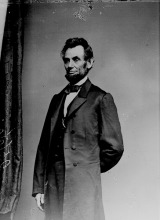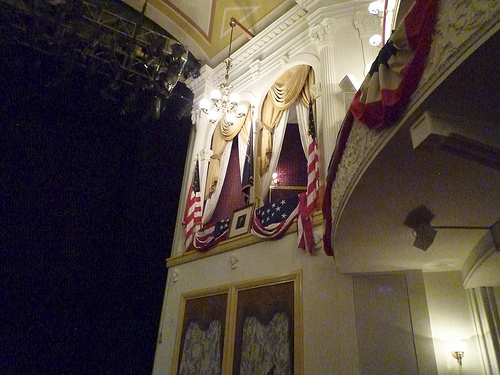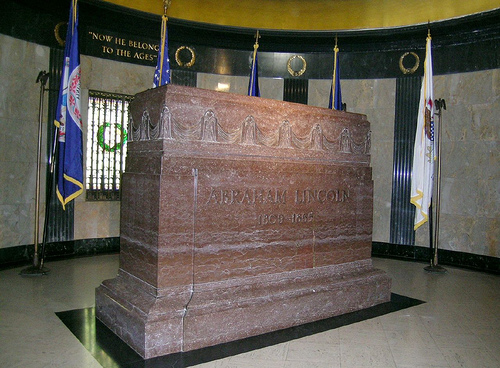Lincoln conspiracy theories run deep, but here's an overview.
Five days after General Robert E. Lee surrendered to General Ulysses S. Grant, Abraham Lincoln was shot by an actor who reportedly was trying to restart the Civil War. The real Abraham Lincoln may not have fought vampires in his spare time as a new movie (based on a successful novel) alleges. But he was a formative presence in the early history of our country.
What might Lincoln have accomplished, if he hadn't been assassinated at the relatively young age of 56? More to the point, what was he killed to prevent? Lincoln conspiracy theories run deep, but here's an overview.
Booth And His Two Pals: The "Simple Conspiracy"
Dubbed "the Simple Conspiracy" by researchers, Booth's conspiracy is well documented in his diaries and letters. John Wilkes Booth and two co-conspirators had arranged a conspiracy to overthrow the American government.
Each of the men was assigned to assassinate a key member of government: Booth was to kill Lincoln, Lewis Powell was to kill Secretary of State William Seward, and George Atzerodt was assigned to kill Vice President Andrew Johnson. By making the government leaderless, Booth and his cronies hoped to give the South a chance to rally and come back to win the Civil War.
Image courtesy Flickr/jason.stajich
Both Powell and Atzerodt failed their assignments. Powell only wounded Seward, and Atzerodt lost his nerve and fled Washington D.C. without making an attempt on Johnson's life.
But who was really pulling the strings? Was this plot just the work of three disgruntled southerners? Or was it part of a larger conspiracy by the South to win the Civil War at any cost? Would the Confederacy have stooped to assassination, planning to take the country by military coup?
Today it is generally recognized that Booth, Powell, and Atzerodt originally planned to merely kidnap their targets. The plan was to hold them hostage for Southern prisoners of war, whom the North had recently stopped trading. No one can be sure when the plan turned to assassination, or why.
Did Lincoln's Nightmare Predict His Own Death?
About two weeks before his assassination, Lincoln had a nightmare in which he wandered an empty White House which rang with the sound of sobbing mourners. In the dream he finally came upon the East Room, where he encountered a corpse wrapped in funeral clothes being mourned by a crowd of people. When Lincoln asked what had happened, he was told that the body was that of the President, who "was killed by an assassin."
Image courtesy Flickr/Kansas Explorer 3128
Even though Lincoln dismissed it as "only a dream," he told his biographer that "I have been strangely annoyed by it ever since." He was still bothered by it some ten days later, just a few days before his assassination.
Was Andrew Johnson Involved?
Vice-President Andrew Johnson escaped Booth's "simple conspiracy" unscathed. And Johnson certainly had motivation to kill Lincoln: once Lincoln was dead, Johnson became president. Johnson also had a grievance against Lincoln, who had shut him out after Johnson's drunken and disgraceful behavior on Inauguration Day. (Johnson would later be impeached on the grounds that he was working to undermine Congress.)
It does seem that Booth and Johnson knew each other, or that Booth seemed to think so. About seven hours before he shot Lincoln, Booth stopped by the hotel where Johnson lived and left him a little note. "Don't wish to disturb you," Booth wrote, "Are you at home? J Wilkes Booth." He left the note in Johnson's box, and Johnson's private secretary later testified that he found it there.
Mary Todd Lincoln herself believed that Johnson was involved in her husband's murder. Then again, some people believe that Booth deliberately left the note in order to implicate Johnson in the assassination he was planning for later that night.
Image courtesy Flickr/Marion Doss
Are The Rothschilds To Blame?
The Rothschilds, the world's most powerful family, seem to find themselves at the center of every conspiracy theory eventually. In the case of Lincoln, there is speculation that the Rothschilds had him killed because of his financial policies.
Image courtesy Flickr/jimbowen0306
When Lincoln needed money to finance the Civil War, the Rothschilds (among others) offered loans at exorbitant interest rates. Lincoln turned down their offer, and found financing through other routes. Furthermore, Lincoln's protectionist policies would have hurt the Rothschilds' bottom line. If they couldn't buy their way into the American government, so the theory goes, the Rothschilds would prefer to assassinate it and roll the dice to try again.
The 18 Missing Diary Pages
Booth famously kept a diary, a small red appointment book (about the size of a modern Moleskine notebook). After Booth was tracked down and killed and his diary examined, eighteen pages had been ripped out and were missing. (These missing pages also featured in the popcorn summer thriller, "National Treasure: Book of Secrets.")
Image courtesy Flickr/bhrome
According to some accounts, 50 years later those missing pages were found hidden in a trunk in the attic of Edwin Stanton, Lincoln's Secretary of War. Stanton has been described as "power hungry," and was later accused of witness tampering and otherwise skewing the results of Booth's trial. It's worth noting that Booth's trial was not held as a civil trial but as a military tribunal, and therefore fell under Stanton's jurisdiction.
The Stanton conspiracy was popularized in a book written in the 1930s which was later turned into an even more popular movie in 1977, "The Lincoln Conspiracy."





